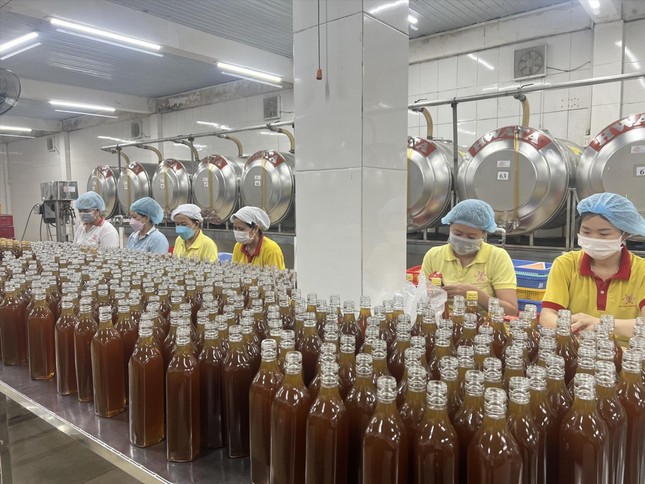Affordable capital is still difficult to access.
Capital is needed to expand the workshop, buy more machinery and equipment… to produce traditional frozen cakes. Ms. Nguyen Thi Huong, representative of Huong Viet Company (Cu Chi District, Ho Chi Minh City) is preparing documents and seeking many banks to borrow VND 10 billion.

Startup businesses with capital needs are hard to borrow. Photo: U.P
At Vietcombank, the interest rate is only 5.3% per year for short-term production and business loans; VietinBank offers 5.7-6.45% per year for short-term and medium-to-long-term loans; BIDV offers 6.5% per year in the first 6 months and 7% per year in the next 12 months…
“In general, lending rates have dropped significantly compared to 2023. However, all banks require collateral. While assets like land and existing workshops are valued very low by the banks, and moreover, our company is a startup, so the borrowing door is closing. The closer the access to cheap interest capital seems to be farther from us” – Mrs. Huong said.
It is also difficult to access low-interest borrowing nowadays. Mr. Vo Minh Hau, Director of Thanh Hoa Garment Company (Thu Duc City) said that he intends to close the workshop due to a lack of capital. Two consecutive years, the company has had no orders but still managed to survive by borrowing from banks to pay workers’ wages.
“The company revolves around payment with banks to avoid bad debts. Now that we have orders coming back but lack capital. We want to borrow but the banks shake their heads because of unpaid debts, no collateral… With more than 20 years working in the garment industry, maybe it’s time for me to sell machines to pay off the debts, quit the job…” – Mr. Hau choked up.

Despite being offered cheap loans, Xuan Nguyen Group still worries about being abruptly cut off from capital. Photo: U.P
While many businesses are unable to borrow, there are still many businesses that are invited by banks for loans. Specializing in producing natural honey-based products, Mr. Lu Nguyen Xuan Vu, CEO of Xuan Nguyen Group (Binh Chanh District) said that many banks have recently contacted and invited him to borrow capital, even two banks have opened credit limits for loans up to hundreds of billions of Vietnamese dong, but the company is still hesitant to borrow and is trying to use its own capital.
Sharing with Tien Phong, Mr. Vu said that he is very happy that the lending policy has been adjusted and lending interest rates have decreased…
“However, we are more worried than happy. Although there is excess capital in banks for borrowing, when the money is exhausted and the banks suddenly withdraw the capital, I don’t know what to do. Although borrowing from banks is a financial leverage, we can only borrow for a short period, from 6 – 9 months.
After this time, the banks will stop lending, which will not only affect businesses and exports but also hundreds of farmers. Instead of becoming a financial leverage, it becomes a trap for businesses. I have experienced it before, so I’m very careful and hesitant…” – Mr. Vu explained.
According to Mr. Vu, although banks have reduced lending rates, the capital is cheap only in the first year but then it fluctuates according to the market price, and the borrowing time is short. Currently, Mr. Vu is borrowing about VND 20 billion personally, accepting a high-interest rate twice as high, but knowing the specific repayment time to use for production and business activities. Mr. Vu believes that banks need long-term and sustainable support for businesses.
Mr. Nguyen Dang Hien, CEO of Tan Quang Minh Manufacturing and Trading Co., Ltd. (Bidrico), Deputy Chairman of Ho Chi Minh City Food Association, believes that banks still assess loans based on collateral instead of assessing the effectiveness of business projects. This makes it difficult for businesses, especially small and medium-sized ones, to access capital due to insufficient collateral requirements.
Solution for businesses
According to the Ho Chi Minh City Business Association (HUBA), in the first 2 months of 2024, the loan situation of businesses is still difficult. Specifically, although there is plenty of capital for lending, small and medium-sized businesses cannot access capital due to not meeting the requirements for collateral or not meeting the conditions for borrowing. In which, the valuation of agricultural land assets is very low, leasehold assets cannot be mortgaged, other assets are devalued due to increasing inflation… HUBA’s survey shows that up to 41% of businesses no longer have legally sufficient collateral assets to borrow money.
Mr. Nguyen Duc Nghia, Deputy Director of the Small and Medium-sized Enterprises Support Center of Ho Chi Minh City, believes that to promote credit growth, it is necessary to focus on many solutions such as creating the best conditions for existing customers to use capital effectively, supporting customers by meeting the best capital needs; continue to consider adjusting the loan interest rate reasonably, in line with financial capacity and the trend of reducing input average interest rates of each credit institution.
In relation to support for businesses, a representative of HUBA believes that banks can consider refinancing in addition to extension. Accordingly, businesses can repay the deferred capital at the last year of the loan term, instead of having to repay immediately when the term expires, doubling the amount to be paid in the following year, creating a double difficulty. Ho Chi Minh City People’s Committee has also suggested to the Government the need to replace the support of 2% per annum interest rates from banks with more practical forms.















